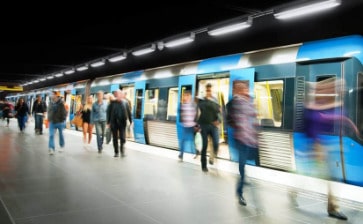Biometrics are increasingly facilitating different processes in the public transportation sector, with new developments emerging from two countries – China and Russia. While a palm vein recognition payment system for metro tickets has been installed for trial at two metro stations in Shanghai and other parts of China, Moscow Transport in Russia says it is innovating and extending its biometric payments system for metro tickets, at a time when it is also discussing plans for introducing driverless trams using neural networks.
Shanghai metro trials palm biometrics payment system
Palm vein recognition technology was recently deployed at two metro stations in China’s largest city, Shanghai, Shine reports. Palm vein scanning devices were installed at the metros to facilitate payments by identifying the user’s palm vein biometrics.
Per the outlet, the same hardware has been deployed in metro stations in other cities of the country including Guangzhou, Shenzhen and Dalian.
The Shanghai Shentong Metro Group, the company running the metro service, says the deployment is purely for testing and an evaluation will be done after the pilot to determine the possibility and feasibility of wider deployments.
In 2019, officials had also announced the installation of a facial recognition system to help tackle problems of overcrowding in metro areas in Beijing, as reported by Daily Sun.
Authorities said at the time that the idea was prompted by problems arising from long queues and arguments common with commuters during rush hours.
With the system, the faces of metro users are scanned as they get access into the subway, according to Zhan Minghui, director of the Beijing Rail Traffic Control Center.
Surveillance systems have also been trialed in London and Montreal to curb public nuisance at subway stations.
Moscow Mayor unveils novelties for Moscow Transport
Plans by Moscow to carry on with its smart cities technologies advancement including the installation of a ‘neural network system’ will continue, the city Mayor, Sergey Sobyanin, has said in a blog article cited by Railtech.
For now, the metro has installed biometric gates, some of which accept payments using facial recognition technology, but the official has announced that more innovations with regard to ticketing are in the offing.
While the official acknowledges the technological successes recorded so far with biometric payments and other automated processes, he mentions that their plan is to expand the technology to make sure that up to 90 percent of all processes are automated with the coming of the neural network.
The planned system, which authorities hope to have in place by 2030, also envisages the introduction of a driverless feature in metro trains and trams, which will be a first for the country. This is expected to be introduced in the second part of the year, the outing quotes the mayor as saying.
Article: Biometric payments for public transportation expand in China, Russia
